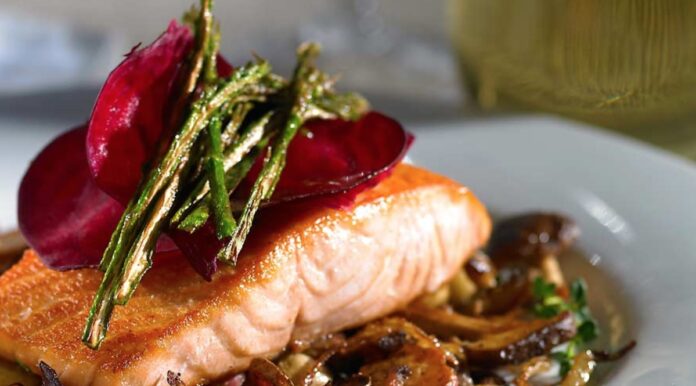The salmon served on most Canadian plates comes from farms, not the wild, and that takes pressure off wild stocks.
comment
By Timothy Kennedy
Climate change poses major challenges to the world’s food production and distribution systems.
Rising temperatures, changing precipitation patterns, and more frequent and catastrophic weather events are having deleterious effects on our diet. Our planet is now home to eight billion people, but over the past 60 years, our changing climate has reduced global agricultural productivity by about 21 percent.
That’s seven years of growth, according to a recent study from Cornell University’s School of Applied Economics and Management.
As COP15 drew to a close in Montreal a few days ago, we saw important progress on biodiversity targets and an opportunity for Canadian aquaculture to play a meaningful role. In particular, the COP15 agreement emphasized the need for sustainable management of fisheries and aquaculture through the promotion of biodiversity-friendly practices and the implementation of innovative approaches that contribute to resilience in food production and security. Canada’s aquaculture sector will play an important role in meeting this global goal – and will be further supported by our new National Commitments on salmon production.
We cannot carry on as before and expect to feed a growing world. We must invest in more resilient food production systems that can withstand the challenges of climate change and population demands to ensure a safe and sustainable food supply now and in the future. Salmon farmers in Canada are uniquely positioned to play a role in supporting this endeavor.
Put salmon farming in the context of some of the recent challenges Canada is facing. On the west coast last fall, a historic drought impacted river levels, killing tens of thousands of wild salmon in British Columbia prematurely, while ocean-raised salmon went untouched with no disruption to supply.
On the East Coast, Hurricane Fiona was the costliest and most intense post-tropical cyclone to strike Canada. Structurally sound salmon farms in Atlantic waters weathered this storm and its aftermath without interruption.
Extreme weather events linked to climate change will continue to increase the risk of food shortages, meaning sustainable solutions like salmon farming are essential, especially in a country like Canada, which is a world leader in aquaculture science and innovation.
There is an increasing demand for seafood and salmon around the world specifically for its health benefits, ease of preparation and taste. However, wild salmon no longer has to be caught to meet the increasing demand.
Salmon farms in BC have begun to face global supply and demand pressures, which are projected to increase by 40 percent (nearly two million tons) by 2027. This rising consumption trend is also reflected in Canada, where Canadians are consuming more salmon in their diet than ever before.
Farm-raised salmon accounts for nearly all salmon produced in Canada. The salmon served on most Canadian plates comes from farms, not the wild. Salmon farming takes pressure off wild stocks to support their recovery. Farming is as beneficial to wild salmon as it is to Canadians, as sustainably farmed salmon is one of the most climate-friendly foods on the planet.
To ensure the sustainability and safety of farmed salmon, Canadian salmon farmers began discussions in 2021 to develop national commitments for the industry. Today we are proud to introduce those commitments to Canadians and the world. These national commitments are the result of input from a diverse list of expert stakeholders and rightsholder groups from Canada’s east and west coasts. These commitments are intended to support the strong values shared by all Canadians and outline priority areas for diligent and continuous improvement in salmon farm operations. These priority areas include new standards for food security, climate change, marine health, fish health, food traceability, public reporting and sustainable feed, supported by actions and targets introduced by the industry this month. Canada’s salmon farmers have committed to fully meeting our national commitments by 2032, including a commitment to transparently report on our progress each year.
Salmon farms have come a long way since the first salmon was raised in Canada just over forty years ago, and farming practices will continue to improve to meet the increasing demand for environmentally responsible, nutritious food. Salmon farmers in Canada are committed to being the very best producers of farmed salmon and global leaders in sustainable aquaculture.
With the longest coastline of any country on earth, Canada has the world’s greatest opportunities for cold-water aquaculture. As the world population continues to grow, Canada should lead the way in providing the world with salmon in a sustainable manner that creates economic growth in coastal and indigenous communities, contributes to the country’s goals of reducing impact on climate, our oceans and wild salmon, and provides a safe food source for Canadians.
I invite you to review our national commitments by visiting www.lovesalmon.ca
(Timothy Kennedy is President and CEO of the Canadian Aquaculture Industry Alliance)















